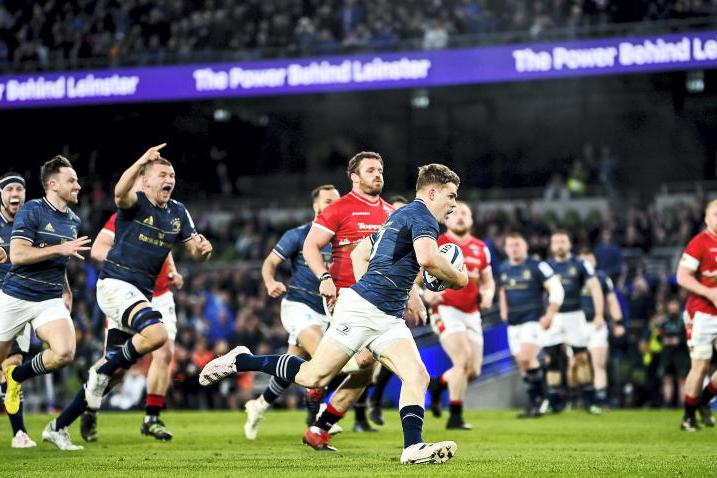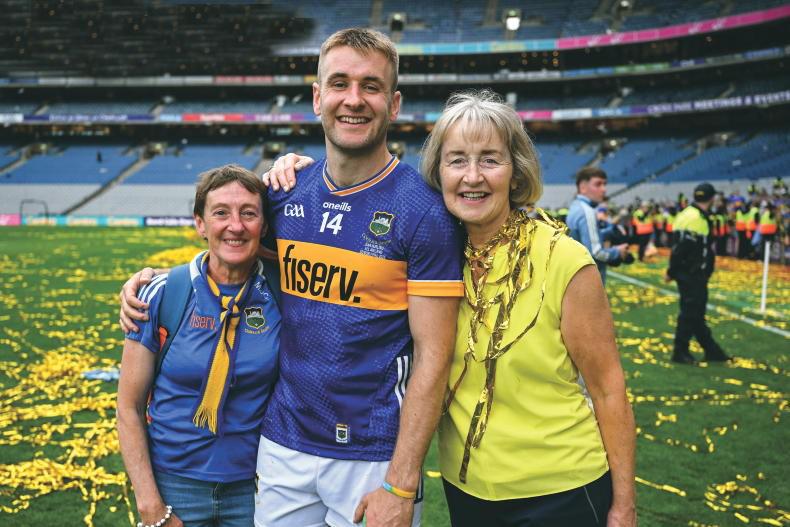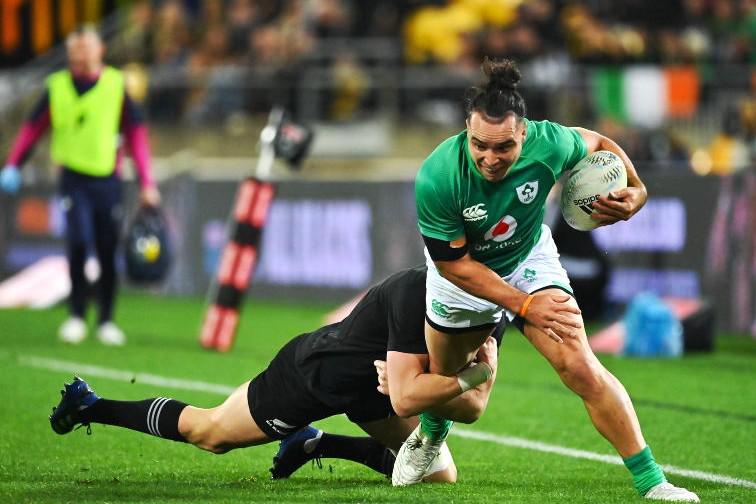The finals in the four divisions of the Lidl Ladies’ NFL take place this weekend.
On Saturday in Croke Park, Armagh take on Laois in the Division 2 decider at 3pm before Kerry and Galway meet for Division 1 honours at 5pm. Then, on Sunday in Parnell Park, Antrim and Letirim vie for the Division 4 crown at 2pm and Clare clash with Kildare in Division 3 at 4pm.
To promote these games, a press day was held at Croke Park on Tuesday, with players from all eight counties present. I’ve covered such events in the past and, while there’ll be some chat about the game, you’re usually looking for some ‘hook’ to build the story around – for example, the player might have recovered from a serious injury or be a star in another sport or have an unusual and interesting job.
For instance, in 2012, Longford were in the Division 4 final against Limerick and they were managed at the time by Mayo native Diane O’Hora, who holds the distinction of being the last All-Ireland-winning captain to receive a trophy in the old Hogan Stand. The narrative wrote itself and she was once again successful in Croker.
Certainly from my own point of view, and I would say it is the same for almost all Gaelic games journalists, you’re cognisant of the fact that the players are amateurs and you don’t want to hang them out to dry on a thorny issue. But, in any case, the players usually put forward are intelligent enough to know how to avoid any pitfalls – or to speak out if they so wish. They are adults, after all.
Asking players to feign ignorance is disingenuous and unfair on them
On the one hand, you can understand the LGFA sending out a four-page document to the participating counties with pointers on how to deal with the press conference. For some players, it might be their first time dealing with such a media glare and tips can be helpful.
However – as revealed by Jason Byrne in The Irish Sun – what was circulated was prescriptive to the point of hand-holding, unable to trust the players to give their own answers.
For instance, Cavan recently refused to fulfil a league game due to issues with their county board and players were told to say: “We’re focusing entirely on our game and our performances. We hope they get the support they need, but I don’t know the specifics so I won’t be getting into it.”
Who’s to say that the players being questioned wouldn’t have a cousin or college friend on the Cavan team and might actually know more details?
There’s nothing wrong with saying you want to focus on your own game, but asking players to feign ignorance is disingenuous and unfair on them. Other matters the document covers include the LGFA’s transgender policy, the proposed GAA/LGFA/Camogie merger and the large numbers of players moving to Australia to play professionally in the AFLW.
The pamphlet ends with the central point once again rammed home: “Media may try to focus on the questions outlined above so please be prepared and also be prepared at all times to move the line of questioning back to football matters.”
Ironically, of course, when the association was contacted by the journalist who broke the story, a spokesperson declined to comment.
Cracking start to
provincial campaign
Well, it seems like any fears around the provincial football championships being completely devalued were overstated, if the opening weekend of action was anything to go by.
Clare’s win over Cork in Cusack Park – just a month after an eight-point loss to the same opposition in the league – means that either they or Limerick will contest the Munster final and there is another knock-on effect in terms of placings for the Sam Maguire.
Indeed, if Kildare and Meath were to both reach the Leinster final, Cork would find themselves in the second-tier Tailteann Cup.
Meanwhile, in Connacht, Mayo were brought down to earth after winning the league as Roscommon outclassed them while New York’s penalty-shootout win over Leitrim created history as it was their first victory in the competition.
Semi-final
The cramped nature of the fixture list means they can’t bask too long in the glory of that but a semi-final against Sligo will be a game that both counties will go into with a real belief that they can win.
After the glut of matches last weekend, there are just two this time – a pair of Ulster quarter-finals as holders Derry begin the defence of their title against Fermanagh, while Monaghan and Tyrone will pen the latest chapter in their ever-intense rivalry.
It seems counter-intuitive, given all the talk about the increase in games and the packed schedule, that there are just two matches down for decision, but it really is the calm before the storm as the Leinster and Munster hurling championships take off the following weekend.
It says a lot about the powerhouse that Leinster have become that they were able to swat aside Leicester Tigers with relative ease in last Friday night’s Heineken Champions Cup quarter-final.
Despite the six-day turnaround after beating Ulster – and the fact that World Player of The Year Josh van der Flier was absent – there was never any doubt about the outcome at Aviva Stadium.
Very quickly, the last 16 of Europe’s top competition has become the last four and a tantalising semi-final with Toulouse awaits – get over that and there is the likelihood of a chance of redemption against the side that beat them in last year’s final, Ronan O’Gara’s La Rochelle.

Garry Ringrose of Leinster on his way to scoring his side's first try during the Heineken Champions Cup quarter-final match between Leinster and Leicester Tigers at the Aviva Stadium in Dublin. Photo by Harry Murphy/Sportsfile
It was almost amusing to hear Leicester head coach Richard Wigglesworth bemoan what he felt was a financial disparity between his side and Leinster – the Tigers didn’t seem to have any problems when they were top of the continental tree two decades ago.
Leinster’s location in Ireland means they do have an advantage over the other three provinces in terms of resources but there’s no accident in them continually challenging for European honours – and certainly no question that it’s down to financial doping.
The finals in the four divisions of the Lidl Ladies’ NFL take place this weekend.
On Saturday in Croke Park, Armagh take on Laois in the Division 2 decider at 3pm before Kerry and Galway meet for Division 1 honours at 5pm. Then, on Sunday in Parnell Park, Antrim and Letirim vie for the Division 4 crown at 2pm and Clare clash with Kildare in Division 3 at 4pm.
To promote these games, a press day was held at Croke Park on Tuesday, with players from all eight counties present. I’ve covered such events in the past and, while there’ll be some chat about the game, you’re usually looking for some ‘hook’ to build the story around – for example, the player might have recovered from a serious injury or be a star in another sport or have an unusual and interesting job.
For instance, in 2012, Longford were in the Division 4 final against Limerick and they were managed at the time by Mayo native Diane O’Hora, who holds the distinction of being the last All-Ireland-winning captain to receive a trophy in the old Hogan Stand. The narrative wrote itself and she was once again successful in Croker.
Certainly from my own point of view, and I would say it is the same for almost all Gaelic games journalists, you’re cognisant of the fact that the players are amateurs and you don’t want to hang them out to dry on a thorny issue. But, in any case, the players usually put forward are intelligent enough to know how to avoid any pitfalls – or to speak out if they so wish. They are adults, after all.
Asking players to feign ignorance is disingenuous and unfair on them
On the one hand, you can understand the LGFA sending out a four-page document to the participating counties with pointers on how to deal with the press conference. For some players, it might be their first time dealing with such a media glare and tips can be helpful.
However – as revealed by Jason Byrne in The Irish Sun – what was circulated was prescriptive to the point of hand-holding, unable to trust the players to give their own answers.
For instance, Cavan recently refused to fulfil a league game due to issues with their county board and players were told to say: “We’re focusing entirely on our game and our performances. We hope they get the support they need, but I don’t know the specifics so I won’t be getting into it.”
Who’s to say that the players being questioned wouldn’t have a cousin or college friend on the Cavan team and might actually know more details?
There’s nothing wrong with saying you want to focus on your own game, but asking players to feign ignorance is disingenuous and unfair on them. Other matters the document covers include the LGFA’s transgender policy, the proposed GAA/LGFA/Camogie merger and the large numbers of players moving to Australia to play professionally in the AFLW.
The pamphlet ends with the central point once again rammed home: “Media may try to focus on the questions outlined above so please be prepared and also be prepared at all times to move the line of questioning back to football matters.”
Ironically, of course, when the association was contacted by the journalist who broke the story, a spokesperson declined to comment.
Cracking start to
provincial campaign
Well, it seems like any fears around the provincial football championships being completely devalued were overstated, if the opening weekend of action was anything to go by.
Clare’s win over Cork in Cusack Park – just a month after an eight-point loss to the same opposition in the league – means that either they or Limerick will contest the Munster final and there is another knock-on effect in terms of placings for the Sam Maguire.
Indeed, if Kildare and Meath were to both reach the Leinster final, Cork would find themselves in the second-tier Tailteann Cup.
Meanwhile, in Connacht, Mayo were brought down to earth after winning the league as Roscommon outclassed them while New York’s penalty-shootout win over Leitrim created history as it was their first victory in the competition.
Semi-final
The cramped nature of the fixture list means they can’t bask too long in the glory of that but a semi-final against Sligo will be a game that both counties will go into with a real belief that they can win.
After the glut of matches last weekend, there are just two this time – a pair of Ulster quarter-finals as holders Derry begin the defence of their title against Fermanagh, while Monaghan and Tyrone will pen the latest chapter in their ever-intense rivalry.
It seems counter-intuitive, given all the talk about the increase in games and the packed schedule, that there are just two matches down for decision, but it really is the calm before the storm as the Leinster and Munster hurling championships take off the following weekend.
It says a lot about the powerhouse that Leinster have become that they were able to swat aside Leicester Tigers with relative ease in last Friday night’s Heineken Champions Cup quarter-final.
Despite the six-day turnaround after beating Ulster – and the fact that World Player of The Year Josh van der Flier was absent – there was never any doubt about the outcome at Aviva Stadium.
Very quickly, the last 16 of Europe’s top competition has become the last four and a tantalising semi-final with Toulouse awaits – get over that and there is the likelihood of a chance of redemption against the side that beat them in last year’s final, Ronan O’Gara’s La Rochelle.

Garry Ringrose of Leinster on his way to scoring his side's first try during the Heineken Champions Cup quarter-final match between Leinster and Leicester Tigers at the Aviva Stadium in Dublin. Photo by Harry Murphy/Sportsfile
It was almost amusing to hear Leicester head coach Richard Wigglesworth bemoan what he felt was a financial disparity between his side and Leinster – the Tigers didn’t seem to have any problems when they were top of the continental tree two decades ago.
Leinster’s location in Ireland means they do have an advantage over the other three provinces in terms of resources but there’s no accident in them continually challenging for European honours – and certainly no question that it’s down to financial doping.










SHARING OPTIONS